

PopEntertainment.com > Feature
Interviews - Actors > Justin Timberlake, Emile Hirsch, Ben Foster,
Anton Yelchin and Shawn Hatosy

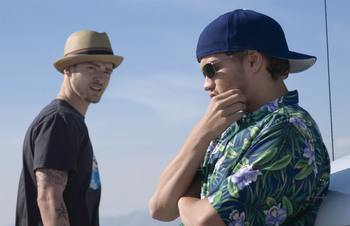 Justin
Timberlake, Emile Hirsch, Ben Foster, Anton Yelchin and Shawn Hatosy
Justin
Timberlake, Emile Hirsch, Ben Foster, Anton Yelchin and Shawn Hatosy
This Team of
Actors is Down in the Dogs
by Brad Balfour
Copyright ©2007 PopEntertainment.com. All rights reserved.
Posted:
January 16, 2007.
Talk
about going against type. After Nick Cassavetes made the treacly The
Notebook, few believed he could go on to direct the likes of Alpha
Dog a nasty, unrepentant documentary-like drama about some pretty
shitty drug-dealing kids from the Los Angeles suburbs who go on to commit a
very stupid kidnapping and murder. But, to make this cautionary tale (based
on the true story of Jesse James Hollywood), Cassavetes did what he had to
do and exposed his cast to some really nihilistic youths a bunch you don't
want to meet anywhere, especially in the hot California sun.
That cast includes Emile Hirsch as the drug-dealing Johnny Truelove; singer
Justin Timberlake is his eternally stoned cohort Frankie Ballenbacher; Ben
Foster's speed-addicted Jake Mazursky, rips off Truelove; Anton Yelchin is
the 17 year-old Zack Mazursky, brother of Jake who thinks he's not kidnapped
by Frankie but just hanging with his brother's dawgs and Shawn Hatosy is the
cretinous underling Elvis Schmidt, who actually guns down Zack for Truelove.
Though Hirsch is best known for his roles in The Dangerous Lives of Altar
Boys, Lords of Dogtown, and The Girl Next Door, he has
never been as punk as he is here. Yelchin has been acting since he was six
months old, and more recently has done House of D. and the upcoming
Fierce People. Hatosy has been in dozens of TV shows including Six
Feet Under. Besides appearing as Angel in X-Men: The Last Stand,
Foster' has been in several major films. Of course, Timberlake is a graduate
of the faux-soulful boy band NSYNC, doing vocals behind his own hits "Cry
Me a River" and "SexyBack," and now portrays this badass buddy.
So together again, this gang gave the following ensemble interview which
in some ways reflects each of the characters these guys portrayed.
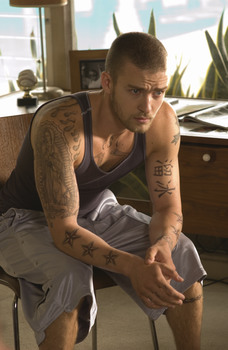 Justin,
some people have said your character is one of the most morally repulsive
characters seen on screen recently.
Justin,
some people have said your character is one of the most morally repulsive
characters seen on screen recently.
Justin Timberlake: I'd like to thank you for pointing that out. We
didn't really plan out the characters, so we didn't intend them to be
repulsive. The point was to reveal the truth of the story. There was so much
information on the [real people involved] and I think that all of us felt
morally responsible for portraying that. This is a tough movie to watch.
This is as close to what happened as we felt like we could make it.
Did you think it was a risk to play this character? Most people want to
play sympathetic characters in high-profiled debut like this.
Justin Timberlake: My only stipulation for the movie was that I just
wanted to crack a couple of jokes here and there. That was it.
So what's going to happen to your music career?
Justin Timberlake: Well I guess we'll just have to wait and see. I
haven't thought that far.
That's right... You have a music career [laughter]?
Justin Timberlake: I know. Yeah, I'm sort of a struggling musician.
I'll give you my demo.
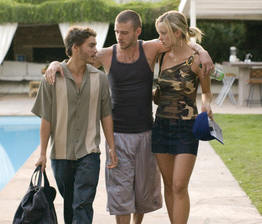 How did you guys particularly you Justin, since you're a newcomer to
acting work together to establish the characters?
How did you guys particularly you Justin, since you're a newcomer to
acting work together to establish the characters?
Shawn Hatosy: Nick [Cassavetes] made us all get together and train,
so that was helpful for us to get to know each other. These characters grew
up together, they played sports together, they did everything together; so
[we got] the opportunity to work out and spend like two months [together]
prior to shooting.
Justin Timberlake: Five days a week.
Shawn Hatosy: Yeah, that was pretty intense.
Emile Hirsch: It was nothing short of boot camp. There's one really
funny story though. We had to lift weights and stuff, and I got it in my
head that since I was the youngest one, that I'm going to make a statement
through this workout. So we had these two-pound weights but we were doing
reps like a thousand times until your arms were dying. Then I showed up and
told our trainer, Frankie, that I was moving on to five pounds. And Shawn
looks at me like "Dude, no, no!" But I was like, "Yeah." So I killed myself
lifting those five pounds and as soon as I finished, [Frankie was like] "You
did, you did? Everyone's doing five." And so we all did five and it was
torture.
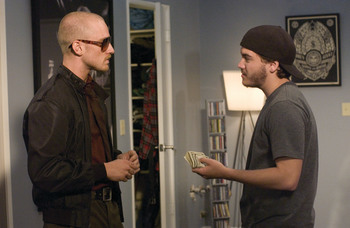 Justin Timberlake: You made some enemies that day.
Justin Timberlake: You made some enemies that day.
So have you guys kept it up?
Justin Timberlake: Does it look like it [laughter]?
Did any of you get to talk with people that experienced the events
surrounding this film or people like them?
Justin Timberlake: I don't know that I knew anyone who was
specifically like this. All of us can relate to the kids. Kids are cruel.
When we signed up for the project, we all got a stack of files. It was so
thick all the police reports, the newspaper reports about what had
happened and I know that Nick was able to really get a lot of information.
We just trusted him, and we all signed up to portray the truth of what
happened. And we followed Nick's lead on that. I actually went with Nick
upstate in Cali to go to prison to visit the guy that my character was based
[on].
Emile Hirsch: I never met Jesse James Hollywood [the real person
Johnny Truelove is based on]. He was on the run at that time. His dad was on
set almost every day, and he told a lot of interesting stories. He
definitely wanted to
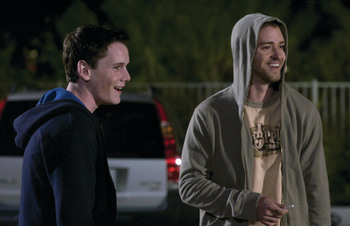 get across that he loves his son, and he's like, "My
kid is good," and it's complicated talking to a father about his son like
that because you don't want to be like, "Oh my god get away from me, you
monster." You have to be understanding and reasonable.
get across that he loves his son, and he's like, "My
kid is good," and it's complicated talking to a father about his son like
that because you don't want to be like, "Oh my god get away from me, you
monster." You have to be understanding and reasonable.
Anton
Yelchin:
But the weird thing is that when you watch the film, like Justin said...
you get a terrible feeling at the end of the film because you liked the
characters for the first half of it. When I watched [the film] I thought
these are cool guys I wouldn't mind spending time with them. And the more
you like them, the more you either feel guilty or at least uncomfortable
with yourself for liking them. It's terrible. When I saw it, I didn't really
know what to do with myself and I knew everything, obviously. But [then]
you watch it and you aren't sure how you feel. You want to like these people
but there's just no way you can. It's almost a paradox.
Were you able to talk to the victim's parents?
Anton Yelchin: No, I didn't but probably one of the most depressing
things I've
seen was this website they created dedicated to their kid. I looked through
that and it was another one of those things I wasn't sure how to feel about
it. The only person I really felt clear about was the kid himself because I
don't know how much you can blame the family. The mother wrote letters to
her son [about] how she misses him and how she's lost him, and how she sees
him every day, and he's this angel. It's just heartbreaking, but at the same
time, she drove him away just as much as she loved him; it's really hard to
handle. It's one of those things where you want to point fingers at
everybody but you can't. The weird thing is that the only choice you have is
to make sure you d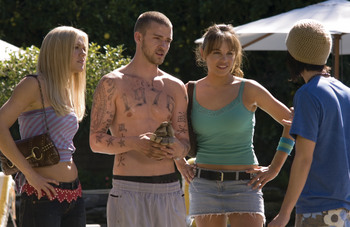 on't do anything similar and hope you are not going to be
as selfish.
on't do anything similar and hope you are not going to be
as selfish.
Did you meet any of the witnesses?
Anton Yelchin: There was actually a guy at The Sundance Film Festival
who was
friends with all these [guys].
Justin Timberlake: In California, it became almost like a legend. It
was really interesting, because around Los Angeles and just outside of it,
people would come up to me and say, "Hey you're doing that movie on the
Jesse James and Nick Markowitz thing, right?" and they would always label
it like that. I would always say "Yeah..." And [they would say], "Yeah, I
knew that guy, Jesse James Hollywood." Like everybody knew somebody that
knew him.
It actually helped when we were making the film to hear those kinds of
things, because you realize how kids spread [the story] and how young people
converse with each other. You can tell immediately that half of the people
who came up to tell you about it knew nothing about it. All they knew was
that [Benjamin] Markowitz was kidnapped and murdered, but they would always
be like "Yeah I knew him." I found it interesting that through his infamy he
became this weird sort of tall tale to these young people, who are, in some
weird way, wanting to be involved with it.
The people who were actually like this what do you think made them like
this?
Anton Yelchin: I don't think it's difficult to find similar people
because of the relative apathy in general that pervades society. These guys
just took it to a different level. It seems shocking when you watch it how
did this happen? But when you think about it, everything is kind of
justified in how ridiculous it is. It just happened and nobody really cared.
It's not hard to find people not caring. It happens all over the world.
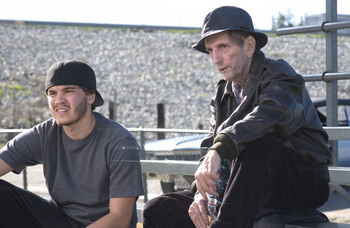 As for your viewing audience, specifically the younger crowd that will
see this film, what do you hope they will come away with upon seeing it?
As for your viewing audience, specifically the younger crowd that will
see this film, what do you hope they will come away with upon seeing it?
Shawn Hatosy: What we are missing, though, is that there were a lot
of parents there who were witnesses as well, and they could have done
something. So these kids were misguided in every sense. Even the love that
Jack Hollywood had for his son was misguided.
Emile Hirsch: It's a good cautionary tale. You've got this kind of
oh-it's-so-crazy party lifestyle, and there's a certain glorification of
that. But that's the hook that gets you. Then it hits you over the head with
reality. So I think it's even more important for young people to see this
because as much as every kid may love rap or really violent music or video
games, it's good for them to get a healthy dose of reality so they don't
think it's just always going to end up riding off into the sunset with no
cops around. It's good to see the consequences.
Have you considered that you have a role in this myth-making by virtue of
the fact that you're entertainers? You can talk about rap and all that but
not all rap or hip-hop is 50 Cent "gangsta" stuff. Some of the myth-making
comes from us too. We are all complacent.
Justin Timberlake: I find that conversations I have with anyone
after they've seen this film is like a group therapy discussion, and
rightfully so. 100% of the people I know, like friends I've brought to
screenings, [feel] they have to speak about the film; they have to talk it
through. I think what this film does is that it's fun, fun, fun and then all
of a sudden, it's not. That was the responsibility of us. Yes, we are
entertainers, but this is a different theme. What I like about the film is
that it doesn't treat you like a dumbass, so to speak it lets you feel
what really happened. You're right it's not all just rap with kids. What I
took away from the film is how just a little perspective on things can
create a humongous outcome in someone's life.
Ben Foster: I mean you bring up rap but it's not rap...
Justin Timberlake: It's hip-hop dammit [laughter]!!!
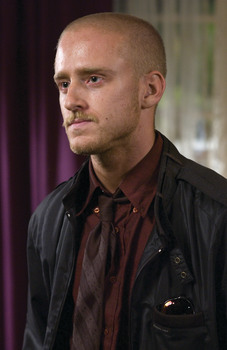 Ben Foster: It's a vacuum of culture. It's prioritizing things that
don't actually have value. The idea of fast cars and a fast lifestyle and
bitches is not solely rap. It's a Hollywood sort of culture. We've always
had violent images in our society and it's getting worse because we don't
have the moral guidelines to guide us along to process these images and
these major entertainments.
Ben Foster: It's a vacuum of culture. It's prioritizing things that
don't actually have value. The idea of fast cars and a fast lifestyle and
bitches is not solely rap. It's a Hollywood sort of culture. We've always
had violent images in our society and it's getting worse because we don't
have the moral guidelines to guide us along to process these images and
these major entertainments.
Justin Timberlake: I think it shortchanges the film to say that rap
music created this. That's not what happened.
Emile Hirsch: I would think movies, more than music would...
Ben Foster: We've always had violent films; we've always had a form
of violent entertainment. People are drawn to that but what is lacking in
this society is [something] guiding us along to find our own morals and
ethics. There is just a vacuum right now. And I think that everybody should
watch this film. We know that young people have this lifestyle. It's not an
exaggeration. This is what it is, and I think that's what drew all of us
into participating in it, because the script is so authentic.
Nick did such an incredible job, documenting it and interviewing the kids.
When you watch it, it feels legit. I was shocked. I knew these kids; I grew
up in Southern California, you know. The fact that it escalated was not
[because of] movies, it was not video games, and was certainly not hip-hop.
It was a lack of guidance.
Email
us Let us know what you
think.
Features
Return to the features page.
